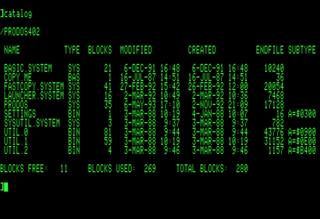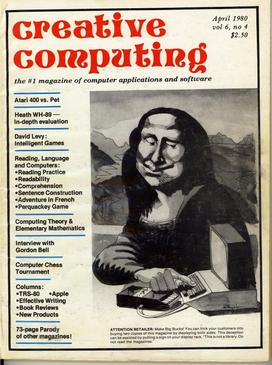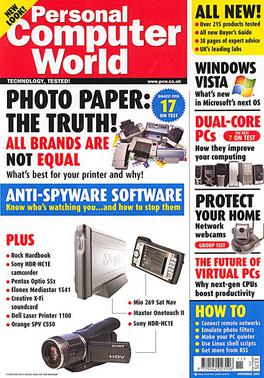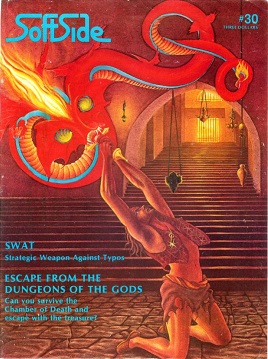Electronic publishing includes the digital publication of e-books, digital magazines, and the development of digital libraries and catalogues. It also includes the editing of books, journals, and magazines to be posted on a screen.

ProDOS is the name of two similar operating systems for the Apple II of personal computer. The original ProDOS, renamed ProDOS 8 in version 1.2, is the last official operating system usable by all 8-bit Apple II computers, and was distributed from 1983 to 1993. The other, ProDOS 16, was a stop-gap solution for the 16-bit Apple IIGS that was replaced by GS/OS within two years.

MacLife is an American monthly magazine published by Future US. It focuses on products produced by Apple, including the Macintosh personal computer, iPad, and iPhone. It was sold as a print product on newsstands, but is now a digital–only product distributed through Magazines Direct and the Mac|Life app, the latter of which can be obtained via the App Store. Between September 1996 and February 2007, the magazine was known as MacAddict.
The Minnesota Educational Computing Consortium, most commonly known as MECC, was an organization founded in 1973 best known for developing the edutainment video game series The Oregon Trail and its spinoffs. The goal of the organization was to coordinate and provide computer services to schools in the state of Minnesota; however, its software eventually became popular in schools around the world. MECC had its headquarters in the Brookdale Corporate Center in Brooklyn Center, Minnesota. It was acquired by SoftKey in 1995 and was shut down in 1999.

Diskworld was a disk magazine for the Apple Macintosh computer system, published by Softdisk beginning in 1988. It was a sister publication of Softdisk for the Apple II, Loadstar for the Commodore 64, and Big Blue Disk for the IBM PC. Diskworld ceased publication in 1998.

Compute!, often stylized as COMPUTE!, was an American home computer magazine that was published from 1979 to 1994. Its origins can be traced to 1978 in Len Lindsay's PET Gazette, one of the first magazines for the Commodore PET computer. In its 1980s heyday, Compute! covered all major platforms, and several single-platform spinoffs of the magazine were launched. The most successful of these was Compute!'s Gazette, which catered to VIC-20 and Commodore 64 computer users.

Creative Computing was one of the earliest magazines covering the microcomputer revolution. Published from October 1974 until December 1985, the magazine covered the spectrum of hobbyist/home/personal computing in a more accessible format than the rather technically oriented Byte.

A disk magazine, colloquially known as a diskmag or diskzine, is a magazine that is distributed in electronic form to be read using computers. These had some popularity in the 1980s and 1990s as periodicals distributed on floppy disk, hence their name. The rise of the Internet in the late 1990s caused them to be superseded almost entirely by online publications, which are sometimes still called "diskmags" despite the lack of physical disks.

Softdisk, originally Softdisk Magazette, was a disk magazine for the Apple II computer line, published from 1981 through 1995. It was the first publication of the company that was also known as Softdisk, which would go on to publish disk magazines for other systems, other software, and later be involved in Internet access, hosting, and development.

Personal Computer World (PCW) was the first British computer magazine. Although for at least the last decade it contained a high proportion of Windows PC content, the magazine's title was not intended as a specific reference to this. At its inception in 1978 'personal computer' was still a generic term The magazine came out before the Wintel platform existed; the original IBM PC itself was introduced in 1981. Similarly, the magazine was unrelated to the Amstrad PCW.

Antic was a print magazine devoted to Atari 8-bit computers and later the Atari ST. It was named after the ANTIC chip in the 8-bit line which, in concert with CTIA or GTIA, generates the display. The magazine was published by Antic Publishing from April 1982 until June/July 1990.Antic printed type-in programs, reviews, and tutorials, among other articles. Each issue contained one type-in game as "Game of the Month." In 1986, STart magazine was spun off to exclusively cover the Atari ST line.
The Apple Pugetsound Program Library Exchange (A.P.P.L.E.) is a users' group established in 1978 by Val Golding.

Computist was a magazine devoted to the Apple II personal computer that was published by Charles R. Haight under the SoftKey Publishing name, between 1981 and 1993, for a total of 89 issues. The magazine was based in Tacoma, Washington. Originally launched as Hardcore Computing, the 'hardcore' part was formally dropped from the title with the 27th issue.
A Macintosh User Group (MUG) is a users' group of people who use Macintosh computers made by Apple Inc. or other manufacturers and who use the Macintosh operating system (OS). These groups are primarily locally situated and meet regularly to discuss Macintosh computers, the Mac OS, software and peripherals that work with these computers. Some groups focus on the older versions of Mac OS, up to Mac OS 9, but the majority now focus on the current version of Mac operating system, macOS.
Apple File Exchange (AFE) is a utility program for Apple Macintosh computers. It was included on the Apple "Tidbits" or "Install 2" disk in system versions 7.0 through 7.1. In System 7.5, it was replaced by PC Exchange.

SoftSide is a defunct computer magazine, begun in October 1978 by Roger Robitaille and published by SoftSide Publications of Milford, New Hampshire.
Val J. Golding founded Apple Pugetsound Program Library Exchange (A.P.P.L.E) in February 1978 with fellow Apple II enthusiasts Mike Thyng and Bob Huelsdonk at the behest of Max Cook, the local ComputerLand store manager. The first meeting of the group had 15 people at it and within a year, the group had grown to a couple thousand Apple computer fans. In 1984, he left the group and went to Shreveport, Louisiana to work for another Apple-related magazine.
An apple is an edible fruit.

Australian Apple Review was an Australian computer magazine published by Gareth Powell Pty Ltd and Saturday Magazine Pty Ltd and initially printed by Offset Alpine and then by Ian Liddel Pty Ltd. The first issue was available in newsagents and dealerships in 1984 at the recommended price of $3.00. Its headquarters was in Randwick, New South Wales.












